May 2011/1 Download
Roundup
Brian Wilson
Download
of the Month
The Queen’s Music: Italian Vocal Duets and Trios
Anonymous Parlate per
me [2:02]
Luigi ROSSI (c.1597-1653)
Tu sarai sempre [2:24]
Antonio CESTI (1623-1669)
Gia son morto [3:05]
Dite o Cieli [1:34]
Anonymous Pian piano mio core [2:43]
Girolamo Alessandro FRESCOBALDI (1583-1643)
Toccate e partite d’intavolatura di cimbalo et organo,
libro primo: Toccata ottava [4:04]
Giacomo CARISSIMI (1605-74)
Sciolto havean dall’alte sponde (I naviganti)
[12:56]
Girolamo Alessandro FRESCOBALDI In
partitura il primo libro delle canzoni: Canzona settima detta
la Superba (o Tuccina) (arr. for cello and harpsichord)
[3:36]
Luigi ROSSI O Cieli pietà
[3:38]
Lasso benche mi fugga [4:40]
Girolamo Alessandro FRESCOBALDI Toccate
e partite d’intavolatura di cimbalo et organo, libro primo:
Toccata nona [5:27]
Luigi ROSSI Pene che
volete [2:06]
Pietà, spietati lumi [2:49]
Anonymous Partitevi da me [2:13]
Luigi ROSSI Vorrei scoprirti
[2:42]
Anonymous Occhi Belli [2:14]
Girolamo Alessandro FRESCOBALDI
Toccate e partite d’intavolatura di cimbalo et organo,
libro secondo: Toccata seconda [3:41]
Anonymous E’ di ragion [4:18]
Emma Kirkby, Susanne Rydén (sopranos); Peter Harvey (baritone);
Mikarl Bellini (counter-tenor); Mime Yamahiro Brinkmann (cello);
Lars Ulrik Mortensen (harpsichord)
rec. Länna Church, Sweden, May 2008. DDD.
Booklet included with texts and translations.
BIS BIS-CD-1715 [68:16] – from eclassical.com
(mp3, lossless and 24-bit) or stream from Naxos Music Library
[A version of this review also appears on the main MusicWeb
International pages - here]
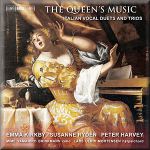 All
that Emma Kirkby’s many fans – I’m a long-standing
member – need to know is that her voice is still holding
up extremely well at an age which I’m too gallant to mention,
but when many sopranos have fizzled out. She receives fine support
from Susanne Rydén, whose voice is just different enough
to be distinguishable from and to blend with Kirkby’s in
duets and ensembles. There’s also predictably first-rate
support from the other performers, excellent recording and short
but informative notes and texts with idiomatic translations.
You may purchase The Queen’s Music with confidence.
All
that Emma Kirkby’s many fans – I’m a long-standing
member – need to know is that her voice is still holding
up extremely well at an age which I’m too gallant to mention,
but when many sopranos have fizzled out. She receives fine support
from Susanne Rydén, whose voice is just different enough
to be distinguishable from and to blend with Kirkby’s in
duets and ensembles. There’s also predictably first-rate
support from the other performers, excellent recording and short
but informative notes and texts with idiomatic translations.
You may purchase The Queen’s Music with confidence.
The programme, derived from a manuscript in the library of Christ
Church, Oxford, and connected with the court of the Swedish
Queen Christina prior to her abdication in 1654, is ideal for
Kirkby and her collaborators. The music is all attractive: it’s
interesting to speculate to what extent Christina’s love
of this kind of Italian music led her to Rome. The most familiar
name among the composers of the vocal items, and the one most
frequently represented on this recording, is that of Luigi Rossi,
closely followed by that of Carissimi, who contributes the longest
item here, I Naviganti, the Sailors.
Most of the music is for two sopranos, but there are other combinations
to provide a variety, including duets for soprano and baritone,
on some of which Kirkby features, with Rydén on others.
The variety is further strengthened by the inclusion of four
keyboard works by Frescobaldi, one of them rearranged for cello
and harpsichord for even greater variety. Lars Ulrik Mortensen
performs these in a manner likely to make you want more –
in which case, you can’t do better than to turn to Richard
Lester’s ongoing series on Nimbus – see review.
Rossi and Carissimi were connected with the early development
of opera and much of their music has an operatic intensity.
I Naviganti in particular, for two sopranos and baritone,
is reminiscent of the semi-operatic Florentine Intermedii
of 1589. The splendid EMI recording of this piece, directed
by Andrew Parrott, seems unfortunately to have fallen out of
the catalogue, though a later version directed by Skip Sempé
is still available as a download from Amazon.co.uk and on CD
from Amazon.com in the US. I Naviganti is not only the
longest work in the collection; it’s also the highlight
as far as I’m concerned.
The Queen’s Music offers 68 minutes of sheer delight, but
I can report an even longer and equally delectable programme.
Emma Kirkby also appears with Jakob Lindberg (lute) on a recent
BIS CD of earlier music, equally divided between Purcell and
Dowland, Orpheus in England, BIS-CD-1725 – also
from eclassical.com
in mp3, lossless and 24-bit. As on The Queen’s Music,
instrumental tracks are interspersed among the vocal items –
nobody does them better or proves a superior accompanist in
the songs than Lindberg.
You may already have some of Kirkby’s earlier recordings
of this repertoire, for example with Anthony Rooley on a most
inexpensive Virgin Veritas 2-CD set (5624102, around £7.50),
but the partnership with Lindberg is – predictably –
at least as fruitful. Essential listening, both.
Bargain of the
Month
William WALTON (1902-1983)
Violin Concerto (rev.1945)* [26:53]
Camille SAINT-SAËNS (1835-1921)
Havanaise, Op. 83** [9:19]
Christian SINDING (1856-1941)
Suite im alten Stil, Op. 10^ [11:46]
Mario CASTELNUOVO-TEDESCO (1895-1968)
Violin Concerto No. 2 ‘The Prophets’ (1931)^^ [29:27]
Jascha Heifetz (violin)
Philharmonia Orchestra/William Walton*
RCA Victor Symphony Orchestra/William Steinberg**
Los Angeles Philharmonic Orchestra/Alfred Wallenstein^/^^
rec. EMI Studio No.1, Abbey Road, London, 26-27 July, 1950*;
Sound Stage 9, Republic Pictures Studio, Hollywood, 18 June
1951**, 9 December 1953^ and 28-29 October 1954^^. ADD/mono.
NAXOS HISTORICAL 8.111367 [77:25] – from classicsonline.com
(mp3) or stream from Naxos Music Library
[A version of this review will also appear on the main MusicWeb
International pages]
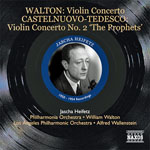 It’s
hardly surprising that the Naxos Historical Great Violinists
series already contains several Jascha Heifetz recordings, including
his 1949 recording of the original score of the Walton Violin
Concerto, coupled with his 1941 version of the Elgar Violin
Concerto on 8.110939 – see review.
Now we have his 1950 recording of the revised version of the
Walton, in re-mastered sound as bright as a button and coupled
with three other recordings from the early LP era. The back
cover of the CD refers to Heifetz’s polished elegance,
but there’s more to it than that. Some of Paganini’s
contemporaries thought that he’d sold his soul to the Devil
to obtain such mastery of the violin: they might well have thought
the same of Heifetz, when everything here seems grist to his
mill.
It’s
hardly surprising that the Naxos Historical Great Violinists
series already contains several Jascha Heifetz recordings, including
his 1949 recording of the original score of the Walton Violin
Concerto, coupled with his 1941 version of the Elgar Violin
Concerto on 8.110939 – see review.
Now we have his 1950 recording of the revised version of the
Walton, in re-mastered sound as bright as a button and coupled
with three other recordings from the early LP era. The back
cover of the CD refers to Heifetz’s polished elegance,
but there’s more to it than that. Some of Paganini’s
contemporaries thought that he’d sold his soul to the Devil
to obtain such mastery of the violin: they might well have thought
the same of Heifetz, when everything here seems grist to his
mill.
The Walton concerto was composed for Heifetz and, while it’s
good also to have more recent versions, notably from Nigel Kennedy,
with the Viola Concerto (not currently available?), Kurt
Nikkanen (Nimbus NI6119 – see October 2010 Download
Roundup), and Naxos’s own digital recording with Dong
Suk-Kang, a splendid bargain coupled with the Cello Concerto
(8.554325 – see review
and November 2008 Download
Roundup), Heifetz still reigns supreme, with Walton and
the Philharmonia providing excellent support and Mark Obert-Thorn
excelling himself with a transfer which makes the recording
sound almost as if it were made yesterday. Even the limitations
of mono hardly seem to matter.
After the Walton, the Saint-Saëns Havanaise inevitably
sounds somewhat trite. Naxos have chosen to present these recordings
in the chronological order of their setting down, but I could
have wished the Walton to have been left until last. Nevertheless,
it’s churlish to complain when Heifetz weaves his magic
here, too, ably abetted by the RCA Orchestra and William Steinberg.
The Sinding Suite is more substantial and it, too, receives
a performance that makes me wonder why we don’t hear this
work as often as the composer’s Violin Concerto.
This recording is rightly regarded as a Heifetz special.
The final work, Castelnuovo-Tedesco’s ‘Prophets’
Concerto was also composed for Heifetz. As the notes observe,
though it pre-dates his time in Hollywood, it does have a Technicolor
quality not unlike Respighi or Korngold. Once more the music
presents no problems for Heifetz and the LAPO under Wallenstein.
Beecham used to have the knack of making good second-rate music
sound first-rate and that’s exactly what all concerned
do here.
I’ve already praised the quality of the Walton transfer
but the whole of the rest of the programme has received equally
fine re-mastering. I’ve heard some fine transfers recently
from Beulah and High Definition Tape Transfers, but nothing
to excel what I hear on this CD. There were just a few moments
in the Castelnuovo-Tedesco when I felt that the treble needed
to be tamed a little, but it’s not a serious problem.
Naxos already have the superb 1955 Heifetz/Reiner recording
of the Brahms Violin Concerto in their download-only
series (9.80081, available in the UK for £1.99). Perhaps
they would consider adding that to the Great Violinists series.
For my money, Heifetz is the exponent of the Brahms, taking
the opening movement at the only speed that makes sense unless
you want to have a work with two slow movements. Only one other
recording, from Szeryng, again with Reiner as conductor, also
from RCA, came close – and that’s deleted.
This fine tribute to Jascha Heifetz is not available in the
USA and in several other countries, for copyright reasons. Fortunately,
the same recording of the Walton is available inexpensively*
on RCA (2 CDs, 74321925752). See reviews by John Quinn –
here
– and Rob Barnett – here.
Soon recordings of this vintage may not be available in the
EU, either, so snap it up while you can.
* It’s on offer so inexpensively that it’s hardly
worth considering downloading it.
Discovery of the
Month
John GARDNER (b.1917)
Flourish for a Wedding, Op. 162 (1983) [2:57]
Easter Fantasy, Op. 232 (1997) [6:41]
Theme and Variations for Brass Quartet, Op. 7 (1952) [11:11]
Five Dances for Organ, Op. 179 (1988) [17:16]
Sonata da Chiesa sopra un thema di Claudio Monteverdi,
Op. 136 (1976) [13:44]
Sonata Secolare, Op. 117 (1973) [15:21]
Paul Archibald (trumpet); Cosmopolitan Brass (Helen Sanger,
Stephen Pemberton (trumpets), Kate Hainsworth, Alex Hambleton
(horns), Craig Beattie, Fabian Schmidt (trombones), Yao Cong
Tan (tuba)); Stephen King (organ); Chris Gardner (conductor):
rec. Brentwood Cathedral, 29-30 January, 12 February, 25 June
2010
TOCCATA CLASSICS TOCC0048 [67:10] – from toccataclassics.com
(mp3) or stream from Naxos Music Library
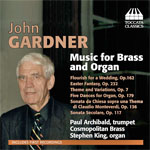 If
you’d asked me what I thought of the tune of the Advent
chorale Wachet auf! as the basis of a work entitled Flourish
for a Wedding before I heard this recording I’d have
said ‘not much’. In the event, it’s a wonderful
introduction to a most enjoyable programme by a composer whom
I’d have said that I’d never heard of before, though
I must have – his music appears on several recordings of
choral music for Christmas. As I write, a week before the Royal
Wedding and a few days before Easter, the first two items are
wonderfully topical.
If
you’d asked me what I thought of the tune of the Advent
chorale Wachet auf! as the basis of a work entitled Flourish
for a Wedding before I heard this recording I’d have
said ‘not much’. In the event, it’s a wonderful
introduction to a most enjoyable programme by a composer whom
I’d have said that I’d never heard of before, though
I must have – his music appears on several recordings of
choral music for Christmas. As I write, a week before the Royal
Wedding and a few days before Easter, the first two items are
wonderfully topical.
John Sheppard made this a well-deserved Recording of the Month
in CD form – here
– and there’s an article by Paul Conway on the composer
here.
A glitch in my review access to Toccata led me to listen via
the Naxos Music Library. They also have the Naxos recording
of Gardner’s Midsummer Ale Overture, First Piano Concerto
and First Symphony (8.570406) which John Quinn thought
well worth investigating – see review
– and which deeply impressed Dominy Clements – see
review.
That’s also available in mp3 from classicsonline.com (mp3)
and passionato.com (mp3 and lossless).
Heinrich SCHÜTZ (1585-1672)
Symphoniæ Sacræ, Book II (1647)
Es steh Gott auf [6:02]
Was betrübst du dich? [5:36]
Singet dem Herrn ein neues Lied [4:28]
Drei schöne Dinge seind [8:18]
Herr unser Herrscher [5:09]
Lobet den Herrn [4:30]
Von Gott will ich nicht lassen [7:43]
Verleih uns Frieden [3:37]
Gib unsern Fürsten [3:56]
Herr, nun lässest Du Deinen Diener im Friede fahren
[3:42]
Freuet euch des Herren [5:10]
Chapelle Rhénane/Benoît Haller – rec. no details
supplied
Booklet with notes in French, English and German, together with
German texts and French translations available from K617 –
here
– click on ‘télécharger le livret’
K617 K617163 [58:32] – from emusic.com
(mp3)
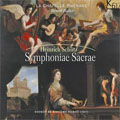 This
is a welcome supplement to the earlier Schütz recording
by these same forces which I reviewed in the December 2009 Roundup.
If you found the Schütz passion settings which I reviewed
last month rather astringent, this is Schütz in a very
different vein: mostly celebratory texts set in an uplifting
style derived from Monteverdi and his Venetian contemporaries.
With sound direction and singing and good recording – albeit
at a range of bit-rates from 180kb/s to 320kb/s, mostly at 192kb/s
– this is well worth £4.62 or less from eMusic. Amazon.co.uk
also have this recording, presumably at a higher bit-rate, for
£7.49.
This
is a welcome supplement to the earlier Schütz recording
by these same forces which I reviewed in the December 2009 Roundup.
If you found the Schütz passion settings which I reviewed
last month rather astringent, this is Schütz in a very
different vein: mostly celebratory texts set in an uplifting
style derived from Monteverdi and his Venetian contemporaries.
With sound direction and singing and good recording – albeit
at a range of bit-rates from 180kb/s to 320kb/s, mostly at 192kb/s
– this is well worth £4.62 or less from eMusic. Amazon.co.uk
also have this recording, presumably at a higher bit-rate, for
£7.49.
Pierre ROBERT (1625-1699) Grands
Motets (1684)
De profundis [16:01]
Requiem æternam [5:46]
Quare fremuerunt gentes [8:29]
Reges eos in virga ferrea [6:07]
Te decet hymnus [10:40]
Præparans montes [5:50]
Rivos ejus inebria [6:49]
Nisi Dominus [9:11]
Olivier Cesarini, Dagmar Saskova, Damien Guillon, Robert Getchell,
Jean-François Novelli, Alain Buet, Arnaud Richard (soloists)
Les Pages et les Chantres du Centre de Musique Baroque de Versailles;
Musica Florea/Olivier Schneebeli
K617 K617215 [68:53] – from emusic.com
(mp3)
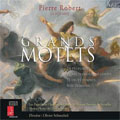 Pierre
Robert has given his name to a distinguished ensemble who record
for the Alpha label. So far as I’m aware, they have left
it to another French label, K617, to record their namesake.
In fact, I can’t find any rival recordings of Robert’s
music in the catalogue, which is surprising when these Grands
Motets are so good.
Pierre
Robert has given his name to a distinguished ensemble who record
for the Alpha label. So far as I’m aware, they have left
it to another French label, K617, to record their namesake.
In fact, I can’t find any rival recordings of Robert’s
music in the catalogue, which is surprising when these Grands
Motets are so good.
No texts this time, even from the K617 homepage, but most of
the words are readily available online. Only Rivos ejus inebria
(fill the rivers [of the land] to overflowing) is unfamiliar
– it’s a text associated with the harvest festivities
formerly celebrated in the Tridentine Rite on the Feast of the
Assumption. The singing is slightly less accomplished than that
of the Chapelle Rhénane in the K617 recording of Schütz
(above), but not so that you would be disappointed.
All the tracks are at a bit-rate higher than 192kb/s –
two are at the maximum 320kb/s – and the sound is good.
John BLOW (1649-1708) Chloe
found Amintas lying (A Song for Three Voices) [6:20];
Ground in g minor for violin and continuo [3:56]
Michel LAMBERT (1610-1696)
Vos mépris chaque jour [3:41]
Robert de VISÉE (c.1655-1732/2)
Chaconne [5:12]
John BLOW Venus and
Adonis (1683) [55:37]
Sophie Daneman (soprano, Venus), Roderick Williams (baritone,
Adonis), Elin Manahan Thomas (soprano, Cupid), Helen Neeves
(soprano, shepherdess), Caroline Sartin (alto, shepherd), Jason
Darnell (tenor, huntsman), Frederick Long (bass, shepherd),
Cupids, from Salisbury Cathedral School: Grace Beverley, Flora
Davies, Kelly Frost, Hermione Leitch, Rebecca Lyles, Helena
Mackie, Georgiana Roxburgh, Rosanna Wicks
Theatre of the Ayre (Rachel Podger, Clare Salaman (violins),
Galina Zinchenko (viola), Alison McGillivray (bass violin and
viol), Pamela Thorby, Kate Latham, Merlin Harrison (recorders),
David Miller (theorbos/guitars), James Johnstone (harpsichord)/Elizabeth
Kenny (director/theorbo/guitar))
rec. live, Wigmore Hall, London, 3 May 2010. DDD
Booklet with texts included.
WIGMORE HALL LIVE WHL0043 (75:14) – from classicsonline.com
(mp3) or stream from Naxos Music Library
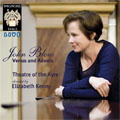 Unless
you have an aversion to baroque pastoral, you should be charmed
by this recording. The Wigmore Hall is my favourite classical
music venue and I wish I’d been there last May when this
concert was given. John Blow rather unfairly plays second fiddle
to his contemporary Purcell; though I’m a great fan of
Purcell, Blow’s Venus and Adonis can look Dido
and Æneas squarely in the eye. The few recordings
that have been made of this work have all been good – an
old, long-deleted SEON version, Philip Pickett on Decca Oiseau-Lyre
478 0019 and René Jacobs on Harmonia Mundi HMG 501684,
the latter two still available at mid-price. This live recording
steals the field, not least for the short works with which the
main dish is seasoned. The recording places the performers a
little more distantly than I’d have liked, but that’s
a minor reservation. The download comes at the attractive price
of £4.99 – and that includes the booklet with the
texts.
Unless
you have an aversion to baroque pastoral, you should be charmed
by this recording. The Wigmore Hall is my favourite classical
music venue and I wish I’d been there last May when this
concert was given. John Blow rather unfairly plays second fiddle
to his contemporary Purcell; though I’m a great fan of
Purcell, Blow’s Venus and Adonis can look Dido
and Æneas squarely in the eye. The few recordings
that have been made of this work have all been good – an
old, long-deleted SEON version, Philip Pickett on Decca Oiseau-Lyre
478 0019 and René Jacobs on Harmonia Mundi HMG 501684,
the latter two still available at mid-price. This live recording
steals the field, not least for the short works with which the
main dish is seasoned. The recording places the performers a
little more distantly than I’d have liked, but that’s
a minor reservation. The download comes at the attractive price
of £4.99 – and that includes the booklet with the
texts.
Georg Philipp TELEMANN (1681-1727)
Trios and Quartets
Quadro in D for 2 Transverse Flutes and 2 Bassoons, TWV43:D2
[8:06]
Trio in d minor for Transverse Flute, Oboe and basso continuo,
TWV42:d4 [8:04]
Quadro in F for Oboe, 2 Bassoons and basso continuo (from Sonata
a 3 TWV42:F16, reconstructed by Sergio AZZOLINI) [10:16]
Quadro in A for 2 Transverse Flutes and 2 Violoncellos, TWV43:A2
[7:10]
Trio in G for Transverse Flute, Oboe and basso continuo, TWV
42:G13 [6:27]
Sonata in g minor for Oboe and Bassoon, TWV41:g12 [9:46]
Trio in e minor for Transverse Flute, Oboe and basso continuo,
TWV42:e9 [6:53]
Quadro in E for 2 Transverse Flutes and 2 Violoncellos, TWV43:E1
[8:31]
Epoca Barocca (Marcello Gatti, Elisa Cozzini (transverse flutes);
Alessandro Piqué (oboe); Sergio Azzolini, Al Ikeda (bassoons);
Ilze Grudule, Stephanie Meyer (cellos); Matthias Spaeter (archlute);
Christophe Lehmann (harpsichord and organ))
rec. Deutschlandfunk Kammersaal, 30 November-3 December, 2006.
DDD.
CPO 777 441-2 [65:57] – from classicsonline.com
(mp3) or stream from Naxos Music Library
Tastes of Europe: Telemann Trios and Quartets
Quartet in G, TWV 43:G6 [7:24]
Trio in e minor for two dessus (top voices) and basso continuo,
TWV 42:e11 [12:42]
Trio 3 in g minor for oboe, violin and continuo (42:g5) [10:56]
Trio 7 in F for recorder, viola da gamba and basso continuo,
TWV 42:F3 [6:48]
Concerto in a minor for recorder, violin, oboe and basso continuo,
TWV 43:a3 [10:19]
Trio in b minor for violin, viola da gamba and basso continuo,
TWV 42:h620 [3:10]
Trio in d minor for recorder, violin and basso continuo, TWV
42:d10 [8:57]
Ensemble Meridiana
LINN RECORDS CKD368 [60:00] – from linnrecords.com
(SACD, mp3, lossless and 24-bit)
[A version of this review will also appear on the main MusicWeb
International pages]
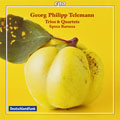 Though
I hadn’t encountered them before, Epoca Barocca have
made a number of recordings – one for Chandos and five
for CPO. Johan van Veen praised their Chandos Hasse recording
for refusing to ‘pump up’ the music to sound more
than it is (CHAN0711 – see review),
and I found their playing here in Telemann to have exactly that
same quality . If that’s what you are looking for, go and
buy with confidence.
Though
I hadn’t encountered them before, Epoca Barocca have
made a number of recordings – one for Chandos and five
for CPO. Johan van Veen praised their Chandos Hasse recording
for refusing to ‘pump up’ the music to sound more
than it is (CHAN0711 – see review),
and I found their playing here in Telemann to have exactly that
same quality . If that’s what you are looking for, go and
buy with confidence.
On this new recording I hear all of the technical skill which
Johan van Veen mentions in that Chandos review and, again, in
his review of Epoca Barocca in Trios and Sonatas by Christoph
Schaffrath (CPO 777 116-2 – see review).
What I don’t hear is the power to rise above the ordinary
which I find almost universally in Telemann’s other music
and I’m inclined to blame the composer rather than the
performers. Though I note that rival recordings of individual
sonatas on the Lyrichord and Accent labels are a little faster
than here – Melomanie take just 7:33 for the Quadro in
D, on LEMS8028, against Epoca’s 8:06 – I don’t
think that’s the major problem.
All the music here is urbane and charming, with sprightly outer
movements and pensive slow movements, and there is variety of
instrumentation between the works, but there isn’t much
more to it. Maybe on this occasion it might have been better
if the Epoca players had done a little pumping to make it sound
a little less ephemeral. Actually, they do try to give the music
a lift, though not quite as much as Melomanie, who succeed slightly
more in catching my interest on that Lyrichord recording. Whatever
the case, this CPO CD or download may be just the thing for
playing softly in the background when guests come round.
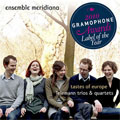 There
is, however, a better option. The Linn recording was made in
York in March 2010 by Ensemble Meridiana, here making
an auspicious recording debut. The music is a cut above that
on the CPO disc, for all that it’s also drawn from TWV42
and TWV43 – either that, or the Meridiana performers make
more of it. 60 minutes of sheer delight.
There
is, however, a better option. The Linn recording was made in
York in March 2010 by Ensemble Meridiana, here making
an auspicious recording debut. The music is a cut above that
on the CPO disc, for all that it’s also drawn from TWV42
and TWV43 – either that, or the Meridiana performers make
more of it. 60 minutes of sheer delight.
Even better is the fact that there is no overlap between these
two recordings. The Linn also includes a Trio now known to have
been composed not by Telemann but by Pierre Prowo.
Both the Linn and CPO discs are well recorded and come with
a helpful programme booklet – not available, unfortunately,
with the download in the case of Linn, despite what I’ve
written to the contrary elsewhere, though the notes can be copied
and pasted from the Linn web-page.
Neither of these new recordings would be my chosen entry-point
for Telemann. A good place to start would be with the various
recordings which Collegium Musicum 90 have made for Chandos
– try CHAN0661 and CHAN0547 for starters – or the
budget-price Hyperion Helios reissue of the a minor Recorder
Suite and other works on CDH55091 (Peter Holstlag and Peter
Holman – see my May 2010 Download
Roundup). The Chandos recordings are best downloaded from
their own theclassicalshop.net and the Hyperion again from the
home site, hyperion.co.uk.
Those who already know some of Telemann’s larger-scale
suites and concertos, and who wish to investigate the Trios
and Quartets could do much worse than the Linn recording. To
investigate this area of Telemann’s output further, I recommend
another CPO recording, Paris Quartets, Volume 1 (777
375-2, with Messrs Holloway, Mortensen, etc. – see review
by Glyn Pursglove). There’s no overlap with either of the
new recordings, but I’d recommend the new CPO recording
only after trying the other two. Subscribers can try all the
recordings which I’ve mentioned, from the Naxos Music Library,
where you’ll also find the CPO booklet and the other Epoca
Barocca recordings for that label. NML also have rival recordings
of some of the individual works on the new CPO CD.
George Frideric HANDEL (1685-1759)
Eight Great Suites for Solo Harpsichord HWV426-433 (1720)
CD 1
Suite No. 1 in A, HWV 426 [11:26]
Suite No. 2 in F, HWV 427 [8:54]
Suite No. 3 in d minor, HWV428 [23:16]*
Suite No. 4 in e minor, HWV 429 [12:46]
CD 2
Suite No. 5 in E, HWV 430 [13:44]
Suite No. 6 in f# minor, HWV 431[9:02]
Suite No. 7 in g minor, HWV 432 [19:49]
Suite No. 8 in f minor, HWV 433 [12:05]
Laurence Cummings (harpsichord)
rec. Handel House London, 4-6 and 9 November 2008. DDD.
Recorded in collaboration with BBC Radio 3 and Handel House
Museum in celebration of Handel’s 250th Anniversary.
* Not 3:16 as stated on rear insert.
SOMM CÉLESTE SOMMCD 095-2 [57:42 + 55:00] –
from theclassicalshop.net
(mp3 and lossless)
Suites for harpsichord: Volume 1
CD 1
Suite in d minor, HWV428 [24:52]**
Suite in A, HWV454 [14:35]
Suite in e minor, HWV438 [8:07]
Suite in C, HWV443 [27:12]
CD 2
Suite in g minor, HWV439 [17:15]
Suite in G, HWV441 [21:49]
Suite in e minor, HWV429 [16:30]
Suite in E, HWV430 [14:50]
Gilbert Rowland (harpsichord)
** Not 42:52 as stated on rear insert.
DIVINE ART DDA2129 [74:54 + 71:34] – from theclassicalshop.net
(mp3 and lossless) or classicsonline.com
(mp3) or stream from Naxos Music Library
[A version of this review will also appear on the main MusicWeb
International pages]
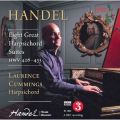 By
what turns out in some ways to have been a fortunate oversight,
the Somm recording got stuck at the bottom of a pile of CDs
for review, with my review half written, until the Divine Art
arrived and reminded me of its existence. As both are available
in download form from theclassicalshop.net, and the Divine Art
recording also from classicsonline.com, the quickest way to
repair the omission and partially make amends to Somm was to
include them in this Roundup, with a more detailed review to
follow on the main MusicWeb International pages.
By
what turns out in some ways to have been a fortunate oversight,
the Somm recording got stuck at the bottom of a pile of CDs
for review, with my review half written, until the Divine Art
arrived and reminded me of its existence. As both are available
in download form from theclassicalshop.net, and the Divine Art
recording also from classicsonline.com, the quickest way to
repair the omission and partially make amends to Somm was to
include them in this Roundup, with a more detailed review to
follow on the main MusicWeb International pages.
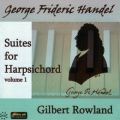 Actually, the two are not direct rivals, since Rowland’s
programme includes only three of the ‘Great’ Suites
from ‘Set 1’ HWV428, 429 and 430 – presumably,
the others will appear in subsequent volumes. They do, however,
share some sloppy booklet and insert proof-reading which makes
HWV428 three minutes long from Cummings and an equally unlikely
43 minutes from Rowland. I’ve given the correct, much closer,
figures above.
Actually, the two are not direct rivals, since Rowland’s
programme includes only three of the ‘Great’ Suites
from ‘Set 1’ HWV428, 429 and 430 – presumably,
the others will appear in subsequent volumes. They do, however,
share some sloppy booklet and insert proof-reading which makes
HWV428 three minutes long from Cummings and an equally unlikely
43 minutes from Rowland. I’ve given the correct, much closer,
figures above.
I can’t pretend that the new CDs are the most exciting
product of the Handel anniversary year and its aftermath, but
they represent a welcome addition to the catalogue. Apart from
the chief competitor, Paul Nicholson on a 2-for-1 Hyperion Dyad
reissue of HWV426-433 plus eight fugues (CDD22045 – download
from Hyperion
in mp3 and lossless), and the few other recordings listed below,
these Suites are not over-represented in the catalogue. Unfortunately
for his rivals, however, Nicholson’s playing is mostly
of very high quality and the Hyperion price highly attractive:
stiff competition for the new releases.
John France regarded the Hyperion set as his benchmark, though
he also thought that Ottavio Dantone’s performances on
Arts 47698-2 and 47699-2, which also contain several extra pieces,
compared favourably – see review.
Mark Sealey thought that Sophie Yates’ recording on Chandos
had much to commend it (Chandos CHAN0644, 0669 and 0688), though
preferring the Arkiv CDR reissue of Trevor Pinnock’s recording
of some of the Suites (410 656-2 – see review).
That Arkiv CD offers rather short value, though the price, currently
$14.99, partially redresses the balance. (Download from passionato
– here
– in mp3 or flac, on special offer for £3.99/£4.99
at the time of writing).
In the main Laurence Cummings is slower than the opposition,
but some of his tempi are decidedly fast: the presto finale
of Suite No.3, HWV428, so familiar from the organ concertos
– Handel’s typical re-use of his own material –
is a case in point. He dashes this off in 4:35, at which speed
it sounds ever so slightly a scramble, as against Nicholson’s
more sedate 5:04 and Rowland’s slightly too deliberate
5:22. Martin Souter (The Gift of Music CCLCD009, Suites 1-5)
is even faster at 4:28, yet contrives to sound deliberate rather
than rushed. Isolde Ahlgrimm (Corona Classic Collection 001952CCC,
Suites 1-4 and Chaconne in G) and Alan Cuckston (Naxos 8.550415,
Suites 1-5) cut the repeat and shorten the movement to 3:00
and 2:38 respectively, thereby almost editing it out of existence,
which is a shame because Ahlgrimm, one of the pioneers of modern
harpsichord playing, gives a very personal interpretation.
We’ve already seen that Rowland is a little more deliberate
than Cummings in the finale of HWV428 and that’s true in
most of the movements of that work. Where Rowland is slightly
faster, the difference is hardly perceptible in practice, but
where he is slower, it’s often by quite a margin:
| |
Cummings |
Rowland |
| Prelude |
0:47 |
1:12 |
| Allegro |
3:08 |
2:41 |
| Allemande |
3:39 |
4:34 |
| Courante |
2:29 |
2:11 |
| Air and Doubles |
8:38 |
8:52 |
| Presto |
4:35 |
5:22 |
I had noted Rowland’s slightly deliberate
manner even before I compared the timings, especially in the
Allemande.
Rowland’s version of HWV429 takes 16:30 overall against
Cummings’ 13:46: this time it’s the fourth movement
Sarabande that accounts for most of the difference, with
honours about even in the other sections. A sarabande is a slow
and stately dance, so there’s a good case to be made for
Rowland’s decision to take almost half as long again as
Cummings, yet ultimately I come down on Cummings’ side.
As a final comparison, I’ll take the famous ‘Harmonious
Blacksmith’, the final Air and Variations from HWV430.
Here, for once, Rowland is slightly faster than Cummings –
4:25 against 4:47 – and both are in line with the view
which most performers take for the tempo here: Cuckston, at
4:39, and Nicholson, at 4:35, split the difference almost exactly.
More to the point, I found none of the over-deliberation in
Rowland’s free-wheeling performance that I noted elsewhere.
I thought his account preferable to the slower tempo adopted
by Cummings and by Blandine Verlet in a recording of the Eight
Suites for Auvidis Astrée (E8655) – on paper, she
seems much faster by dint of omitting some repeats. On the other
hand, if you want this movement played in a lighter, more pastoral
style on a softer-voiced instrument, the gentle touch and more
distant recording of Cummings on Somm will be your preferred
choice. He evokes, as it were, the village blacksmith whose
name has come to be attached to this piece; all the more so
when it’s played on its own.
It’s swings and roundabouts, then, in terms of performance
from Cummings, Rowland and Nicholson. That all three are Handelians
through and through is never in doubt: Laurence Cummings in
particular is the director of the London Handel Festival and
has participated in a number of admirable recordings of the
composer for Somm, as conductor (Joshua, SOMMCD240-2; Esther,
SOMMCD238) and as a member of the London Handel Players (Flute
Concerto and others, SOMMCD055; Violin Sonatas, SOMMCD068),
all available for download from theclassicalshop.net. Until
I started making direct comparisons, my feeling was that I could
be happy with any one of these three sets and that remains true.
With two CDs for the price of one, the Hyperion is the least
expensive and the lossless download comes at the same price
as the mp3, £7.99, with the booklet as part of the deal.
Classicsonline offer the 2-CD Divine Art set for £9.98,
but there’s no booklet. theclassicalshop.net charge £11.99
or £14.99 for the Somm (mp3/lossless respectively).
The difference between the two recordings and instruments which
I noted in the finale of HWV430 is true throughout, with Rowland
recorded closer and at a higher volume than Cummings. The closeness
of the Divine Art recording is likely to become more tiring
than the Somm, though I think you’re hardly likely to want
to play both CDs in one go.
The Somm notes are brief but generally to the point, though
nowhere will you find reference to that well-known nickname
for the finale of HWV430. No booklet is offered with either
set from either of the download sites.
From Somm, two CDs, each playing for less than an hour, are
poor value by today’s standards, when Hyperion offer several
extra works on Paul Nicholson’s recording. Divine Art also
give you more music for your money and spread their net more
widely than just the works of Set 1. I’d love to leave
it at that and sit on the fence, but I know that you want me
to plump, so, for overall satisfaction with tempo and performance,
availability of booklet for download, and with both lossless
sound and mp3 at a very reasonable price, it has to be Paul
Nicholson on Hyperion.
Johann Sebastian BACH (1685-1750)
Jesu, Joy of Man’s Desiring (from Cantata No.147)
Myra Hess (piano) – rec. 1940. ADD/mono
BEULAH EXTRA 4BX175 [3:08] – from Beulah
(mp3)
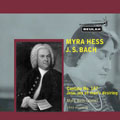 A
brief and enjoyable reminder of those recitals which Myra Hess
gave at the National Gallery as her contribution to morale and
the war effort, from an HMV recording which originally coupled
a Scarlatti Sonata. A contemporary review uses just about every
glowing epithet that its writer could think of, concluding ‘No
lovelier, more entirely satisfactory record has come my way
for many a long day. Everyone must get it.’ Now Beulah
offer it for a fraction of the equivalent of the original price
on 78. I’d expected Hess to lay on the emotion rather too
thickly, but she lets the music speak for itself. For once,
I’m not going to disparage the concert grand in Bach –
the music wasn’t written for the keyboard, so a harpsichord
or fortepiano would be no more authentic – and the recording
is good enough not to hinder the modern listener’s enjoyment.
A
brief and enjoyable reminder of those recitals which Myra Hess
gave at the National Gallery as her contribution to morale and
the war effort, from an HMV recording which originally coupled
a Scarlatti Sonata. A contemporary review uses just about every
glowing epithet that its writer could think of, concluding ‘No
lovelier, more entirely satisfactory record has come my way
for many a long day. Everyone must get it.’ Now Beulah
offer it for a fraction of the equivalent of the original price
on 78. I’d expected Hess to lay on the emotion rather too
thickly, but she lets the music speak for itself. For once,
I’m not going to disparage the concert grand in Bach –
the music wasn’t written for the keyboard, so a harpsichord
or fortepiano would be no more authentic – and the recording
is good enough not to hinder the modern listener’s enjoyment.
Johannes-passion (St John Passion), BWV 245
Markus Schäfer (tenor) – Evangelist; Thomas Oliemans
(baritone) – Jesus
Carolyn Sampson (soprano); Michael Chance (alto); Marcel Beekman
(tenor); Peter Kooij (bass)
Cappella Amsterdam
Orchestra of the Eighteenth Century/Frans Brüggen –
rec. live, March/April 2010. DDD.
GLOSSA GCD92113 [2CDs 72:50 + 38:25] – from eclassical.com
(mp3 and lossless) or classicsonline.com
(mp3) or stream from Naxos Music Library.
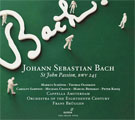 I’m
listening to this recording and writing this review of the latest
recording of my favourite of the Bach passions on Good Friday,
so I’m afraid that you’ll be reading about it rather
late for this year, but you may wish to store it in your wish-list
for next year.
I’m
listening to this recording and writing this review of the latest
recording of my favourite of the Bach passions on Good Friday,
so I’m afraid that you’ll be reading about it rather
late for this year, but you may wish to store it in your wish-list
for next year.
A rather subdued opening Herr, unser Herrscher did not
bode well, but I soon began to warm to this performance. It’s
less intense than John Eliot Gardiner’s recording on a
similar scale, but the Johannes-passion lends itself
well to more meditative treatment. Vocally the only small fly
in the ointment is the singing of Michael Chance – not
a voice for which I have much affection, but you may well think
otherwise. Check it out via the Naxos Music Library if you can.
Alternatively, Passionato have the Gardiner version at a discount
for £6.49 at the time of writing – here.
I didn’t have time to request a review download, so I listened
via the Naxos Music Library. The sound is adequate but the 320kb/s
download from classicsonline will undoubtedly be better –
and the lossless version from eclassical, at just $13.95, better
still. There are no texts, but these are readily available online.
Easter Oratorio, BWV249 [41:18]
Ascension Oratorio (Cantata No.11), BWV11 [29:05]
Carolyn Sampson (soprano); Iestyn Davies (counter-tenor); James
Gilchrist (tenor); Peter Harvey (bass); Retrospect Ensemble/
Matthew Halls
rec. 22- 25 February 2010, St Jude’s Church, London, UK.
DDD
pitch: A = 415 Hz
Texts and translations included
LINN RECORDS CKD373 [70:26] – from linnrecords.com
(SACD, mp3, lossless and 24-bit downloads)
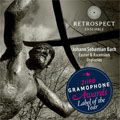 This,
too, has just missed the Easter boat. Unfortunately, my reviewer’s
code for Linn was refreshed on the very day that I’d just
closed the April/2 Roundup, but it should still be Eastertide
when you read this review, with the second half of the recording
in time for Ascension. The Ascension Oratorio is actually
a Cantata (No.11), but it’s no less a miniature masterpiece
for all that. Both works have been recorded many times, often
coupled as here: the new recording joins the best of them.
This,
too, has just missed the Easter boat. Unfortunately, my reviewer’s
code for Linn was refreshed on the very day that I’d just
closed the April/2 Roundup, but it should still be Eastertide
when you read this review, with the second half of the recording
in time for Ascension. The Ascension Oratorio is actually
a Cantata (No.11), but it’s no less a miniature masterpiece
for all that. Both works have been recorded many times, often
coupled as here: the new recording joins the best of them.
Matthew Halls has produced some wonderful recordings for Hyperion
and Linn with performers from the former King’s Consort,
so I had high expectations of this recording, especially when
I saw the very impressive line-up of soloists. At first I was
a little disappointed by the opening Sinfonia of the Easter
Oratorio and the joyous Kommt eilet und laufet –
just a little lacking in exuberance and perhaps a shade slow,
I thought, but the surprise is that in both sections Halls is
actually marginally faster than Paul McCreesh (DG) and Andrew
Parrott (Virgin). On my second hearing, everything fell into
place: this is a performance that grows on you.
I’m not going to dispose of Parrott’s version of the
Easter Oratorio on a Virgin twofer (5616472), coupled
with a version of the Ascension Oratorio just as fine as on
the new Linn recording, plus the Magnificat and Cantatas
4 and 50 – it’s not just a superb bargain at less
than £8, the performances and recording hold up well.
Don’t download it, however – you may well end by paying
more than the very inexpensive CDs.
You’re unlikely to regret buying the Linn in one form or
another – and those who must have SACD or a 24-bit download,
or must have the texts and translations, will find that there’s
no contest: for them the Linn recording is a must.
Wolfgang Amadeus MOZART (1756-1791)
Piano Concerto No.20 in d minor, K466 (Cadenzas by Beethoven)
Annie Fischer (piano); Philharmonia Orchestra/Sir Adrian Boult
– rec.1960. ADD/stereo.
BEULAH EXTRA 1-3BX130 [31:16] – from Beulah
(mp3)
Violin Concerto No.3 in G, K216 (Cadenzas by David Oistrakh)
David Oistrakh (violin); Philharmonia Orchestra – rec.1958.
ADD/stereo.
BEULAH EXTRA 5-8BX71 [23:46] – from Beulah
(mp3)
Symphony No.29 in A, K201
Sinfonia of London/Sir Colin Davis – rec.1958. ADD/stereo
BEULAH EXTRA 1-4BX129 [23:36] – from Beulah
(mp3)
Symphony No.39 in E-flat, K543
Sinfonia of London/Sir Colin Davis – rec.1958. ADD/stereo
BEULAH EXTRA 5-8BX129 [28:47] – from Beulah
(mp3)
Ideally, there should always be some Bach and some Mozart in
this Roundup and I must thank Beulah for providing it –
evidently May is Mozart month this year with four classic recordings
restored.
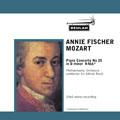 The
virtues of Annie Fischer’s Mozart remain undiminished by
the passage of years – indeed, I think what was described
in 1960 as a somewhat masculine style is closer to what we expect
now, and it’s offset by some really delicate playing in
the slow movement. With well judged accompaniment from Boult
and the Phiharmonia – I hardly noticed the off-tune woodwind
in the first movement – the recording still sounds well.
It captures the divided strings which Boult rightly insisted
on and all that’s missing is the art-work which Columbia
used to lavish on their recordings.
The
virtues of Annie Fischer’s Mozart remain undiminished by
the passage of years – indeed, I think what was described
in 1960 as a somewhat masculine style is closer to what we expect
now, and it’s offset by some really delicate playing in
the slow movement. With well judged accompaniment from Boult
and the Phiharmonia – I hardly noticed the off-tune woodwind
in the first movement – the recording still sounds well.
It captures the divided strings which Boult rightly insisted
on and all that’s missing is the art-work which Columbia
used to lavish on their recordings.
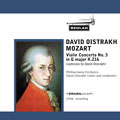 The
Oistrakh recording appeared in harness with Prokofiev. His Mozart
is still as much a delight as it was then; it’s no longer
yoked to an unlikely fellow and the recording still sounds fresh.
The soloist acting as conductor is no longer such a novelty,
but I don’t remember anyone doing the double act better.
Oistrakh opened my ears to the magic of the Beethoven Violin
Concerto at the Festival Hall in the early 1960s and he’s
equally persuasive with Mozart. Two feathers in Beulah’s
cap, then. Can the other two recordings match?
The
Oistrakh recording appeared in harness with Prokofiev. His Mozart
is still as much a delight as it was then; it’s no longer
yoked to an unlikely fellow and the recording still sounds fresh.
The soloist acting as conductor is no longer such a novelty,
but I don’t remember anyone doing the double act better.
Oistrakh opened my ears to the magic of the Beethoven Violin
Concerto at the Festival Hall in the early 1960s and he’s
equally persuasive with Mozart. Two feathers in Beulah’s
cap, then. Can the other two recordings match?
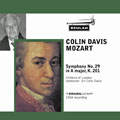 The
two symphony recordings come from early in Colin Davis’s
career when EMI were still not prepared to let him loose on
the market at full price. His now vintage Beethoven Seventh
Symphony appeared on the lower-price HMV Concert Classics
label and his Mozart on World Record Club. These two symphonies
came out together and Symphony No.34 with Leon Goossens
in the Oboe Concerto. I wore out my copy of the latter,
until Classics for Pleasure came to my rescue and reissued it.
The
two symphony recordings come from early in Colin Davis’s
career when EMI were still not prepared to let him loose on
the market at full price. His now vintage Beethoven Seventh
Symphony appeared on the lower-price HMV Concert Classics
label and his Mozart on World Record Club. These two symphonies
came out together and Symphony No.34 with Leon Goossens
in the Oboe Concerto. I wore out my copy of the latter,
until Classics for Pleasure came to my rescue and reissued it.
The view at the time, however, was that his version of No.29
was too sluggish and that of No.39 not much faster. Certainly
he seemed to have rethought it by the time he recorded it again
with the LSO four years later, with No.40 on Philips. This was
an LP which remained a staple of my library for many years.
No.29 opens rather slowly, though the delicacy of the playing
from the Sinfonia of London and Davis’s pointing of the
music compensate, apart from some rather off-form wind playing
in the third movement. Karl Böhm, recorded ten years later
with the Berlin Philharmonic for DG, is slightly slower than
Davis: that was about the going rate then.
Davis’s Mozart is certainly not the only show in town but
his recordings of it with the Sinfonia of London, later the
LSO and later still the Dresden Staatskapelle rank among the
best. Even now the recording sounds well, nicely capturing the
lightweight performance of No.29 and the rather heavier one
of No.39.
Ludwig van BEETHOVEN (1770-1827)
Symphony No.3 in E-flat, Op.55
London Philharmonic Orchestra/Sir Adrian Boult – rec.1957.
ADD/stereo
BEULAH EXTRA 26-29BX12 [46:57] – from Beulah
(mp3)
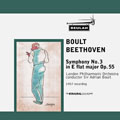 Beulah
have already given us Kleiber’s recording of the Eroica
(5-8BX6 – see February 2011 Roundup).
Boult’s reading is rather less individual – good middle
of the road, lighter than Kleiber – but the recording requires
a great deal of tolerance even though Beulah have tidied up
the reverberation which was originally a problem, at the expense
of making the sound rather dry now. I prefer the Kleiber, but
the recording there, too, is mono only and far from ripe.
Beulah
have already given us Kleiber’s recording of the Eroica
(5-8BX6 – see February 2011 Roundup).
Boult’s reading is rather less individual – good middle
of the road, lighter than Kleiber – but the recording requires
a great deal of tolerance even though Beulah have tidied up
the reverberation which was originally a problem, at the expense
of making the sound rather dry now. I prefer the Kleiber, but
the recording there, too, is mono only and far from ripe.
Gioachino ROSSINI
(1792-1868) La Gazza Ladra Overture
Concertgebouw Orchestra Amsterdam/Eduard van Beinum – rec.1952.
ADD/mono
BEULAH EXTRA 7BX37 [9:49] – from Beulah
(mp3)
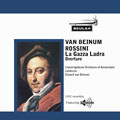 I’m
slightly confused here. The track information says ‘The
Art of van Beinum #1’ and there is, indeed, a Beulah album
with that name, the first track of which is a Rossini Overture
– but it’s La Scala di Seta, not La Gazza
Ladra. Puzzles apart, this is an enjoyable performance and
the recording is reasonably good for its early-LP date, if a
little more muffled than you might expect; indeed, when it first
appeared on LXT2733, this was the one overture to be excepted
from the adjective ‘brilliant’. For all my reservations
about the sound, I hope that Beulah will give us the rest of
that LP – and, perhaps, Pierino Gamba’s slightly later
Decca recordings of this repertoire.
I’m
slightly confused here. The track information says ‘The
Art of van Beinum #1’ and there is, indeed, a Beulah album
with that name, the first track of which is a Rossini Overture
– but it’s La Scala di Seta, not La Gazza
Ladra. Puzzles apart, this is an enjoyable performance and
the recording is reasonably good for its early-LP date, if a
little more muffled than you might expect; indeed, when it first
appeared on LXT2733, this was the one overture to be excepted
from the adjective ‘brilliant’. For all my reservations
about the sound, I hope that Beulah will give us the rest of
that LP – and, perhaps, Pierino Gamba’s slightly later
Decca recordings of this repertoire.
Joseph LANNER (1801-1843) Pesther
Waltz, Op.93
Berlin Philharmonic Orchestra/Hans Pfitzner – rec. 1932
ADD/mono
BEULAH EXTRA 1BX126 [6:34] – from Beulah (mp3)
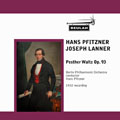 Many
of Lanner’s waltzes are of such high quality that it’s
easy to see why he was such a rival for the Strauss family.
I don’t think I’d heard this one before – presumably
written for the Hungarian city of Pesth before its union with
Buda across the river. It’s no rival to the hegemony of
the Strausses, but it’s pleasant music, idiomatically performed.
The recording is a trifle thin, but good for its age –
more than acceptable – and well worth the modest price.
Many
of Lanner’s waltzes are of such high quality that it’s
easy to see why he was such a rival for the Strauss family.
I don’t think I’d heard this one before – presumably
written for the Hungarian city of Pesth before its union with
Buda across the river. It’s no rival to the hegemony of
the Strausses, but it’s pleasant music, idiomatically performed.
The recording is a trifle thin, but good for its age –
more than acceptable – and well worth the modest price.
Robert SCHUMANN
(1810-1856) The Classical Guide to Schumann
Includes complete performances of:
Piano Concerto in a minor, Op.54* [29:34]
Symphony No.1 (‘Spring’)** [31:38]
Kinderscenen*** [20:27]
Abegg Variations^ [7:13]
Symphony No.4 in d minor, Op.120 (movements iii and iv)****
[15:15]
Waldscenen (substantial extracts)*** [9:10]
Liederkreis (substantial extracts)^^ [13:34]
Dichterliebe (substantial extracts)^^^ [6:09]
and other shorter extracts
Martha Argerich*; Maria-João Pires***; Michel D’Alberto^
(piano); Chamber Orchestra of Europe/Nikolaus Harnoncourt*/****;
Leipzig Gewandhaus Orchestra/Kurt Masur**; Dietrich Fischer-Dieskau^^
WARNER CLASSICS AND JAZZ [152:33] – from iTunes
(mp3)
Also available on a budget-price 2-CD set, The Schumann Experience,
2564684921
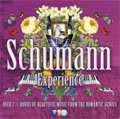 After
a very shaky start, with some dodgy orchestral playing in the
opening bars – or is it the recording, or the CD burner
built into Warner’s MPE player? – the Piano Concerto
turns into a decent performance; though not one of Martha
Argerich’s greatest, it makes a fine opening for this super-budget
price set. The rest of the programme, too, is well worth considering
for those exploring Schumann for the first time. With complete
performances of the wonderfully buoyant ‘Spring’
Symphony – a bracing performance, but hardly effacing
memories of Sawallisch (EMI) or the 10" Decca LP with Josef
Krips from which I learned to love this work – plus Kinderscenen
and substantial extracts from Waldscenen, Liederkreis
and Dichterliebe, the programme is less bitty than on
many of these Warner Classics introductory sets. Apart from
that opening, the recording is good.
After
a very shaky start, with some dodgy orchestral playing in the
opening bars – or is it the recording, or the CD burner
built into Warner’s MPE player? – the Piano Concerto
turns into a decent performance; though not one of Martha
Argerich’s greatest, it makes a fine opening for this super-budget
price set. The rest of the programme, too, is well worth considering
for those exploring Schumann for the first time. With complete
performances of the wonderfully buoyant ‘Spring’
Symphony – a bracing performance, but hardly effacing
memories of Sawallisch (EMI) or the 10" Decca LP with Josef
Krips from which I learned to love this work – plus Kinderscenen
and substantial extracts from Waldscenen, Liederkreis
and Dichterliebe, the programme is less bitty than on
many of these Warner Classics introductory sets. Apart from
that opening, the recording is good.
Richard WAGNER (1813-1883)
Albumblatt in E (Lied ohne Worte)
Robert Zailer (violin); Berlin State Opera Orchestra/Clemens
Schmalstich – rec. 1930. ADD/mono
BEULAH EXTRA 1BX127 [4:13] – from Beulah
(mp3)
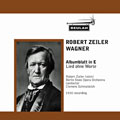 Unusual
Wagner – not what you’d expect at all. The recording
is rather thin and tonally insecure but this is currently one
of only two ways to obtain this arrangement of a pleasant little
work originally for the piano. The other is on a CD of recordings
by David Oistrakh – with the Beethoven Triple Concerto
and the Brahms Double Concerto (Monopole MONO16). If
you want the Wagner on its own, here it is for a very modest
sum. The piano original seems not to be available.
Unusual
Wagner – not what you’d expect at all. The recording
is rather thin and tonally insecure but this is currently one
of only two ways to obtain this arrangement of a pleasant little
work originally for the piano. The other is on a CD of recordings
by David Oistrakh – with the Beethoven Triple Concerto
and the Brahms Double Concerto (Monopole MONO16). If
you want the Wagner on its own, here it is for a very modest
sum. The piano original seems not to be available.
Antonín DVOŘÁK
(1841-1904) Symphony No.8 in G, Op.88
National Symphony Orchestra/Basil Cameron – rec. 1946 ADD/mono
BEULAH EXTRA 3-6BX27 [36:03] – from Beulah
(mp3)
[Listen to excerpts from this performance on YouTube –
here]
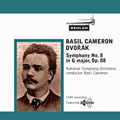 Many
years ago, when I was an undergraduate, a friend bought the
George Szell Ace of Clubs recording of the Eighth Symphony
– still then known as No.8 (4) – and we listened together
to that and the Ninth, the New World Symphony (Karel
Ančerl on Supraphon). We agreed that the New World totally
eclipsed its predecessor, but over the years I’ve come
to regard the Eighth as almost its equal, largely because
of a number of excellent recordings, none more convincing than
Rafaël Kubelík, now at mid price on DG The Originals
447 4122 or Iván Fischer on Channel Classics CCSSA90110,
both coupling Nos. 8 and 9, so you can make the comparison for
yourself. See my review of the passionato download of the latter
in its earlier incarnation on the Philips label in the July
2010 Download
Roundup.
Many
years ago, when I was an undergraduate, a friend bought the
George Szell Ace of Clubs recording of the Eighth Symphony
– still then known as No.8 (4) – and we listened together
to that and the Ninth, the New World Symphony (Karel
Ančerl on Supraphon). We agreed that the New World totally
eclipsed its predecessor, but over the years I’ve come
to regard the Eighth as almost its equal, largely because
of a number of excellent recordings, none more convincing than
Rafaël Kubelík, now at mid price on DG The Originals
447 4122 or Iván Fischer on Channel Classics CCSSA90110,
both coupling Nos. 8 and 9, so you can make the comparison for
yourself. See my review of the passionato download of the latter
in its earlier incarnation on the Philips label in the July
2010 Download
Roundup.
This 1945 recording is no match for Kubelík or Fischer
sonically – there’s even a touch of surface noise,
unusual for Beulah – though the ear soon adjusts to the
lack of the higher frequencies. The performance, which opens
very winsomely, is one of the best, Kubelík and Fischer
included: if my friend and I had been comparing this Cameron
version with the New World back then, I don’t think
that we’d have dismissed it so lightly.
España
Emmanuel CHABRIER (1841-1894)
España, Rhapsody for orchestra (1883) [6:30]
Joaquín TURINA (1882-1949)
Danzas Fantásticas, Op. 22 (1920) [15:13]
Joaquin RODRIGO (1901-1999)
Concierto de Aranjuez for guitar and orchestra (1939)*
[23:37]
Maurice RAVEL (1875-1937)
Alborada del gracioso (1905/1918) [7:49]
Manuel DE FALLA (1876-1946)
Three dances from the ballet El sombrero de tres picos
[12:00] (1919)
Arturo MÁRQUEZ (b. 1950)
Danzón No. 2 (1994) [9:43]
*Marlon Titre (guitar)
Anhaltische Philharmonie Dessau/Antony Hermus
rec. 1-2 July 2010, Anhaltisches Theater, Dessau. DDD
ACOUSENCE 21610 [75:00] from linnrecords.com
(mp3, 16-bit/44.1kHz flac/wma, 24-bit/96kHz flac/wma, 24-bit/192kHz
flac)
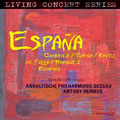 This
is a double first for me: a download from Linn’s online
catalogue and a 24-bit/192kHz Studio Master, too. Thus far I’ve
auditioned some of Chandos’ 24/96 downloads and found them
very good indeed, although they don’t all justify the hefty
premium over the equivalent CD. Linn’s pricing is broadly
in line with the existing business model, with prices ranging
from £8 for 320kbps mp3s to £20 for 24/192 Studio
Masters. Individual tracks are available and artwork/liner-notes
are downloadable from what is a fairly user-friendly site. Linn
offer their own recordings for download, as well as those of
other labels such as Channel Classics and Acousence. I’ve
certainly admired Channel’s fine SACDs, one of which was
among my picks for 2010, but Acousence is new to me.
This
is a double first for me: a download from Linn’s online
catalogue and a 24-bit/192kHz Studio Master, too. Thus far I’ve
auditioned some of Chandos’ 24/96 downloads and found them
very good indeed, although they don’t all justify the hefty
premium over the equivalent CD. Linn’s pricing is broadly
in line with the existing business model, with prices ranging
from £8 for 320kbps mp3s to £20 for 24/192 Studio
Masters. Individual tracks are available and artwork/liner-notes
are downloadable from what is a fairly user-friendly site. Linn
offer their own recordings for download, as well as those of
other labels such as Channel Classics and Acousence. I’ve
certainly admired Channel’s fine SACDs, one of which was
among my picks for 2010, but Acousence is new to me.
Also unfamiliar are the Anhaltische Philharmonie Dessau and
their Dutch conductor Antony Hermus, heard here in a selection
of Spanish/South American music. This is natural territory for
Ernest Ansermet and the Suisse Romande orchestra, whose indispensable
performance of the Chabrier is reissued as part of a 2-CD set
from Decca Eloquence (review).
This has a freshness and spontaneity that’s hard to beat;
not only that, the sound is exceptionally full and vivid, proof,
if it were needed, that vintage recordings can challenge the
best on offer today.
With Ansermet’s España still fresh in my
mind, I was keen to hear how this Dessau account – and
the sonics – would compare. Not very well, is the short
answer. True, the dynamic range of this Acousence release is
almost uncomfortably wide, and will surely appeal to those looking
for an out-and-out hi-fi experience. That said, while the playing
is suitably febrile, it lacks the last ounce of rhythmic flair,
that essential elasticity, that Ansermet brings to the piece.
It’s not always easy to judge these things, but I’d
say the Dessau acoustic is somewhat lively and a tad excitable,
so the tuttis aren’t as tidy as they might be. The bass
drum and brass playing are fabulous, though.
The three Danzas Fantásticas are well played,
but again rhythms aren’t as supple as I’d like. Even
so, instrumental detail is quite remarkable, helped no doubt
by the close, high-level recording; indeed, I had to lower the
volume considerably before I felt comfortable, especially in
the orgiastic third dance. Definitely one to loosen the roof
tiles and/or alarm the neighbours.
The Concierto de Aranjuez is also recorded up-close-and-personal,
which means the soloist sounds far too prominent. The jumbo-sized
guitar aside, the orchestral playing just isn’t very idiomatic;
Titre’s performance doesn’t strike me as particularly
distinguished either, although there’s some lovely playing
in the Adagio. The abiding impression, though, is that despite
the promise of a more realistic listening experience –
the USP of high-cost, high-res releases – this recording
sounds strangely contrived and synthetic. That’s certainly
true of Alborada del gracioso; although the performance
is superficially exciting. Bass-drum junkies won’t be disappointed;
it just isn’t very believable.
Goodness, what a disappointment this is turning out to be. Regrettably,
the dances from El sombrero de tres picos aren’t
very inspired either; oh, how one longs for the flamboyance
of Ansermet in these pieces. In mitigation, the final dance
(Jota) has formidable range and bite. After that orchestral
machismo the gentle, almost feminine, start to Arturo Márquez’s
Danzón No. 2 comes as a welcome relief; it’s
short-lived though, with a return to that thumping bass. Incidentally,
if you want to hear a thoroughly idiomatic version of this,
try Gustavo Dudamel and his young Venezuelans (review).
It may not have the hi-fi credentials of this Acousence release,
but as a performance it’s infinitely more satisfying.
Listening fatigue is always a risk with high-octane collections
such as this, and I have to say it sets in rather early here.
There are far, far better performances of these works elsewhere
– no doubt many are available in downloadable form –
so I’d spend that twenty quid elsewhere. And despite any
allusions – intended or otherwise – to Mercury’s
famous ‘Living Presence’ or RCA’s ‘Living
Stereo’ releases, this ‘Living Concert’ fails
to deliver. As for the download process, it’s a doddle,
although these large files take a while to transfer, even with
a reasonably fast broadband connection.
Dan Morgan
Vincent d’INDY (1851-1931)
Orchestral Works Vol. 4
Poème des rivages – Suite symphonique en quatre
tableaux (ed. Cyril Bongers) (1919-1921) [39:37]
I. Calme et lumière. Agay (Méditerranée)
[11:32]
II. La joie du bleu profond. Miramar de Mallorca (Méditerranée)
[5:33]
III. Horizons verts. Falconara (Adriatique) [8:22]
IV. Le mystère de l’Océan. La Grande Côte
(Golfe de Gascogne) [13:53]
Symphonie italienne (1870-1872) [37:01]
Iceland Symphony Orchestra/Rumon Gamba
rec. 27-30 September 2010, Háskólabió,
Iceland. DDD
CHANDOS CHAN10660 [76:53] from theclassicalshop.net
(mp3, lossless and Studio 24bit/96kHz) or stream from Naxos
Music Library
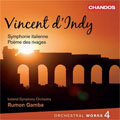 I
much enjoyed the fourth volume of Gamba’s d’Indy cycle
on CD – review
– and as I had the Studio 24bit/96kHz download to hand
I was keen to see how they compared. There was no doubt when
I did something similar with the Noseda/BBC Philharmonic recording
of Casella’s Second Symphony; the high-res download
made an already fine performance seem even more vital and involving
(review).
That said, buyers will need to decide for themselves whether
any such improvement justifies the hefty premium Chandos charge
for these files.
I
much enjoyed the fourth volume of Gamba’s d’Indy cycle
on CD – review
– and as I had the Studio 24bit/96kHz download to hand
I was keen to see how they compared. There was no doubt when
I did something similar with the Noseda/BBC Philharmonic recording
of Casella’s Second Symphony; the high-res download
made an already fine performance seem even more vital and involving
(review).
That said, buyers will need to decide for themselves whether
any such improvement justifies the hefty premium Chandos charge
for these files.
The d’Indy series is beautifully played and recorded, the
shifting colours and supple rhythms of these painterly pieces
well caught by the Chandos team. The atmospheric start to the
first part of Poème des rivages, with its falling
string figures, is a case in point, the music emerging as if
from a morning mist. The playing of the Iceland orchestra is
as refined and nuanced as one could wish, and the grateful acoustic
certainly helps. Switching to the download – piped through
the same Xonar Essence sound-card – reveals a touch more
air around the notes, the overall sound much more keenly focused.
Perversely, that’s not necessarily an improvement in a
score that majors in soft edges; and, if anything, the added
clarity makes the tuttis seem a little fierce.
So, not a chalk-and-cheese situation at all, although the pointillist
elements of La joie du bleu profond and the dynamic swings
of Horizons verts do benefit from the more upfront presentation
of the download. Generally, though, there’s not that
much of a difference, although the bass drum and cymbals in
Horizons verts do sound more visceral in the download;
that said, many listeners might well prefer the softer, more
seductive sound of the disc.
It’s only in the deep-tugging riptide of Le mystère
de l’Océan – with its Stygian bass and
blazing brass – that one really begins to appreciate the
added weight, range and thrust of these high-res files. There’s
some gorgeous, almost holographic woodwind playing too, the
opening of d’Indy’s youthful Symphonie italienne
simply startling in its presence and power. And that holds for
the rest of this work, whose blend of extrovert gestures and
intimate interludes has seldom sounded so beguiling.
On its own terms this download is very impressive indeed; but,
as I’ve suggested, choosing between this and the CD isn’t
as straightforward as you might think. Either way these are
fabulous performances, fully deserving of a place on your shelf
or hard drive.
Dan Morgan
[There’s not much to add, except that the ‘ordinary’
lossless version sounds well, too, though the opening of Poème
des Rivages is so soft as to be barely audible, even with
the volume turned up – not one to listen to in the car,
I fear. BW.]
Sir Edward ELGAR (1857-1934)
Falstaff, Symphonc Study, Op.68
London Philharmonic Orchestra/Sir Adrian Boult – rec. 1956.
ADD/stereo
BEULAH EXTRA 25BX12 [33:43] – from Beulah
(mp3)
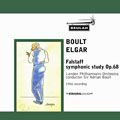 With
Elgar’s own historical version* and Sir Andrew Davis’s
highly-praised digital recording on a super-budget Warner Apex
CD – see review
– it might seem that this particular musical larder is
fully stocked. But there’s always room for Boult’s
interpretation, characterised at the time of its first release
on a 10" Nixa mono LP as riper, more genial and expressive
than its Decca rival from Anthony Collins. I concur with all
those adjectives – I’d even say that they applied
to this version even more than to Davis – and the recording
still sounds well, though it’s no match for the Warner
version in that respect. Like the original LP, the transfer
benefits from a boost in volume.
With
Elgar’s own historical version* and Sir Andrew Davis’s
highly-praised digital recording on a super-budget Warner Apex
CD – see review
– it might seem that this particular musical larder is
fully stocked. But there’s always room for Boult’s
interpretation, characterised at the time of its first release
on a 10" Nixa mono LP as riper, more genial and expressive
than its Decca rival from Anthony Collins. I concur with all
those adjectives – I’d even say that they applied
to this version even more than to Davis – and the recording
still sounds well, though it’s no match for the Warner
version in that respect. Like the original LP, the transfer
benefits from a boost in volume.
As a welcome pendant to their recent reissue of Campoli’s
recording of Elgar’s Violin Concerto, Beulah have
now added his 1931 version of La Capricieuse, Op.17,
with Harold Pedlar at the piano (10BX10 [3:21]).
* Amazon offer this as a download for a mere £0.79 –
here
– and subscribers to eMusic can obtain it for £0.42
or less –
here – but I can’t vouch for the quality.
Frederick DELIUS (1862-1934)
On hearing the first Cuckoo in Spring* [6:53]
Léo DELIBES (1836-1891)
Le Roi s’amuse – ballet music* [14:07]
Jules MASSENET (1842-1912) La
Vierge: The last Sleep of the Virgin** [5:10]
Hector BERLIOZ (1803-1869)
Les Troyens – Overture*** [5:38]
Royal Philharmonic Orchestra/Sir Thomas Beecham – rec 1956
ADD/stereo*; 1953 ADD/mono**; 1954 ADD/mono***
BEULAH EXTRA 1BX43, 2BX43, 3BX43, 4BX43 [timings as listed
above] – from Beulah
(mp3)
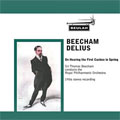 If
I wanted to choose four pieces by which to represent Beecham
at his best, my choice would have included at least three of
these. The First Cuckoo comes from his classic stereo
Delius recordings, recently reissued on a super-budget 6-CD
set (EMI 9099152, with music by Bax, Berners, Bantock and German)
– see review.
The only problem with this inexpensive Beulah download is that
it will almost inevitably make you want to buy that set –
it’s a real bargain at around £17.50, less than £3
per CD – or download the earlier Beecham/Delius Great Recordings
of the Century album from passionato.com.
If
I wanted to choose four pieces by which to represent Beecham
at his best, my choice would have included at least three of
these. The First Cuckoo comes from his classic stereo
Delius recordings, recently reissued on a super-budget 6-CD
set (EMI 9099152, with music by Bax, Berners, Bantock and German)
– see review.
The only problem with this inexpensive Beulah download is that
it will almost inevitably make you want to buy that set –
it’s a real bargain at around £17.50, less than £3
per CD – or download the earlier Beecham/Delius Great Recordings
of the Century album from passionato.com.
Similarly, the ballet music from le Roi s’amuse –
another Beecham speciality – may tempt you to purchase
the whole album from which it comes, on CD or from passionato.
Both these recordings are in good stereo, though the Delibes
sounds a little subfusc by comparison with my CD copy.
The Massenet Last Sleep is the Beecham ‘lollipop’
par excellence; though others have performed it, they
have never achieved quite the success of Beecham, who neither
underplays nor over-emphasises the pathos. The mono sound is
more than acceptable.
After these essentials, the Berlioz is a welcome extra.
Frederick DELIUS (1862-1934)
On hearing the first Cuckoo in Spring
London Symphony Orchestra/Geoffrey Toye – rec.1928. ADD/mono
BEULAH EXTRA 1BX128 [6:16] – from Beulah
(mp3)
A Village Romeo and Juliet: The Walk to the Paradise Garden
London Symphony Orchestra/Geoffrey Toye – rec.1930. ADD/mono
BEULAH EXTRA 2BX128 [8:12] – from Beulah
(mp3)
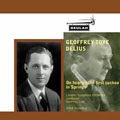 The
Dutton CD transfer of these and other ‘classic’ Toye
recordings of Delius is no longer available, so these Beulah
releases are timely. Delius is reported to have admired Toye’s
recordings of his music, though he’s better known today
as the composer of the ballet The Haunted Ballroom.
The
Dutton CD transfer of these and other ‘classic’ Toye
recordings of Delius is no longer available, so these Beulah
releases are timely. Delius is reported to have admired Toye’s
recordings of his music, though he’s better known today
as the composer of the ballet The Haunted Ballroom.
Beulah have already given us Beecham’s Cuckoo (above)
– the version par excellence, though Vernon Handley
(Classics for Pleasure) and Sir Andrew Davis (Warner Apex) run
him close. These performances by Toye are nothing like as special,
nor is the recording in the same league though it’s very
good for its age and Beulah have done a really fine job of keeping
the surface noise down while maintaining the quality of the
sound.
Olivier MESSIAEN (1908-1992)
Turangalîla-symphonie (1946, rev. 1990)
Howard Shelley (piano)
Valérie Hartmann-Claverie (ondes-martenot)
BBC Philharmonic Orchestra/Yan Pascal Tortelier
rec. 8-9 January 1998, New Broadcasting House, Manchester, UK.
DDD
CHANDOS CHAN 9678 [75:12] from theclassicalshop.com
(mp3 and lossless)
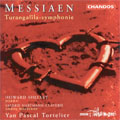 We
all have at least one – a recording we ‘imprinted’
upon and which, to us at least, can never be bettered. André
Previn’s classic Turangalîla is mine. I wore
out the LPs, never tiring of those exotic harmonies and hypnotic
rhythms. EMI’s 1977 recording is pretty spectacular too,
Messiaen’s sister-in-law Jeanne Loriod splendid on the
all-important ondes. I’ve heard a number of performances
since then, live and on record, although I seem to have missed
the Tortelier CD along the way; at least this lossless download
is a good opportunity to rectify that oversight.
We
all have at least one – a recording we ‘imprinted’
upon and which, to us at least, can never be bettered. André
Previn’s classic Turangalîla is mine. I wore
out the LPs, never tiring of those exotic harmonies and hypnotic
rhythms. EMI’s 1977 recording is pretty spectacular too,
Messiaen’s sister-in-law Jeanne Loriod splendid on the
all-important ondes. I’ve heard a number of performances
since then, live and on record, although I seem to have missed
the Tortelier CD along the way; at least this lossless download
is a good opportunity to rectify that oversight.
Tortelier’s Turangalîla gets off to an arresting
start, brass and percussion well caught, the piano very much
to the fore. It’s a purposeful, less flowing performance
than Previn’s, but what it lacks in momentum and cumulative
power it makes up for in detail. It’s more spikily ‘modern’
in its presentation, especially at the start of Chant d'amour
I. Here, Loriod’s ondes is the more voluptuous,
Previn’s sense of cosmic rapture replaced by Tortelier’s
almost forensic desire to unearth all the nuances of this extraordinary
score.
Make no mistake, this is a gripping performance, and the BBC
Philharmonic play very well indeed. In Turangalîla
I, the contrast between contemplation and ecstasy is starker
than ever, the clarinet solos in both versions winningly played;
as for Chant d’amour II, there’s also a Ravelian
glitter to the music that one doesn’t hear with Previn.
That may have something to do with the more forward placing
of the piano, Howard Shelley eliciting a tingle or two with
his ethereal playing at the close of this movement. That said,
Previn triumphs in those mystic plosions, the LSO percussion
– cymbals in particular – superbly rendered. Honours
are more evenly divided in Joie du sang des étoiles;
if anything, Tortelier’s sense of urgency and his painterly
attention to each daub of colour is even more persuasive than
Previn’s broad-brush approach at this point.
The profoundly beautiful music of Jardin du sommeil d’amour
is one of the high points of Previn’s recording, and while
Tortelier isn’t as radiant there’s a heady scent in
this darkened garden that’s just intoxicating. Not only
that, the sense of a deep communion, of a shared epiphany, is
remarkable. In Turangalîla II, the piano part and
chamber-like cello passages remind one of just how natural the
Chandos recording is in terms of sound and balance. Ditto Tortelier’s
percussion in Développement de l’amour which,
although not quite as showy as Previn’s, has a subtle but
no less powerful presence. It’s only in those orchestral
supernovae – Previn is peerless here – that Tortelier’s
leaner, more controlled reading is found ever so slightly wanting.
The reach-out-and-touch-it tangibility of this Chandos recording
is most impressive, notably in the quieter moments of Turangalîla
III, where Messiaen’s score has a multi-faceted sparkle
that I’ve not heard before. Predictably, Previn’s
Finale has all the grande joie one could hope for, but
then Tortelier’s brighter, more analytical reading is every
bit as overwhelming. There can be few more spectacular consummations
in all music, and both conductors do Messiaen proud.
Perfect? No, not quite, but if you want a revealing, top-notch
Turangalîla to add to your collection of downloads
then this must be the one. Those who don’t already own
the Previn – either on CD or as a pricey DVD-A/DVD-V –
should seek it out; in a discography stuffed with bona-fide
classics this is simply indispensable. Tortelier’s
Turangalîla is very different – perhaps complementary
is a better description – and I’m delighted to have
heard it at last. As usual, the Chandos download process was
straightforward; sound and supporting paperwork are up to the
standards of the house as well.
Go for it.
Dan Morgan
[It’s getting to be a habit, but, having listened to this
recording, I agree with Dan’s review without wanting to
add much. I’ve been trying without success to learn Sanskrit,
but I do know that lîla means ‘play’,
‘sport’, ‘amusement’ or ‘pastime’
and that’s an element which I’m pleased to find in
good measure in this performance, albeit that I shan’t
be getting rid of my recording by Riccardo Chailly (Decca 436
6262 – download from passionato.com
in mp3, reduced to £3.99 at the time of writing). Passionato
also have the Previn version to which Dan refers, but it’s
one of those ridiculous cases where the lossless download costs
more than twice as much as the CD set (EMI Century Classics
2068672 or Gemini 5865152, both at around £8). BW]
Astor PIAZZOLLA (1921-1992)
Tango Distinto
Michelangelo 70 [2:54]
Histoire du Tango: II. Café, 1930 [7:02]; III.
Nightclub, 1960 [6:02]
Soledad [8:44]
Le Grand Tango [1:28]
Oblivion [3:52]
Escualo [3:57]
Serie del Angel (arr. Gabriel SENANES)
I. La muerte del angel [3:57]
II. Milonga del angel [7:10]
III. Resurreccion del angel [6:54]
Tanti anni prima, ’Ave Maria’ [4:35]
Achille Liarmakopoulos (trombone); Hector del Curto (bandoneón);
Octavio Brunetti (piano); Pedro Giraudo (double-bass); Simon
Powis (guitar); Ian Rosenbaum (marimba); Robert Thompson (piano);
Edson Scheid, Jiyun Han (violin); Raul Garcia (viola); Arnold
Choi (cello); Maura Venti (harp)
NAXOS 8.572596 [66:35] – download only, from classicsonline.com
(mp3) or stream from Naxos Music Library
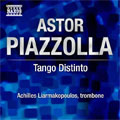 Piazzolla’s
music appears in a variety of arrangements, but this is claimed
as the first recording with a trombone as the constant element.
I don’t recall having encountered the young Greek trombonist
Achille Liarmakopoulos before, but he’s a fine exponent
of the music, in combination with a variety of other instruments.
You probably already know if you like Piazzolla’s music
– and it’s very hard to dislike. If you don’t,
this is as good a way as any to get to know it, perhaps alongside
the Naxos recording of the Sinfonía Buenos Aires
and Estaciones Porteñas which I reviewed in the
February 2011 Roundup
(8.572271).
Piazzolla’s
music appears in a variety of arrangements, but this is claimed
as the first recording with a trombone as the constant element.
I don’t recall having encountered the young Greek trombonist
Achille Liarmakopoulos before, but he’s a fine exponent
of the music, in combination with a variety of other instruments.
You probably already know if you like Piazzolla’s music
– and it’s very hard to dislike. If you don’t,
this is as good a way as any to get to know it, perhaps alongside
the Naxos recording of the Sinfonía Buenos Aires
and Estaciones Porteñas which I reviewed in the
February 2011 Roundup
(8.572271).
Because this is, for the moment at least, download only, there
is no booklet, but you’ll find a tab which leads you to
‘about the music’.
John RUTTER (b. 1945)
Gloria (1974) [17:21]
Magnificat (1990) [39:15]
Te Deum (1988) [7:54]
Elizabeth Cragg (soprano)
Tom Winpenny (organ)
The Choirs of St Albans Cathedral
Ensemble DeChorum/Andrew Lucas
rec. Cathedral and Abbey Church of St Alban, St Albans, Hertfordshire,
UK, 13-14 July, 2010 (Magnificat) and 16-17 July, 2010
(Gloria and Te Deum). DDD
Texts included
NAXOS 8.572653 [64:40] – from classicsonline.com
(mp3) or stream from Naxos Music Library
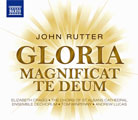 Not
surprisingly – and most certainly not without merit –
Naxos and Classicsonline are making a feature of this recording.
I know that there are some church-music traditionalists who
dislike Rutter’s music, but I’m not among them. Certainly
he gives a lift to the music, but his settings are in a direct
line of descent from those of his predecessors in a way that
ad hoc guitar strumming at Mass can never be. A cathedral
or collegiate choir like that of St Alban’s who perform
here could use these three settings at the principal Sunday
services alongside plainsong or renaissance polyphony for the
other items without a sense of dichotomy. Yes, some part of
the Gloria are (gloriously) brash but there are some
really wonderful quiet and contemplative moments, too, especially
in the Magnificat.
Not
surprisingly – and most certainly not without merit –
Naxos and Classicsonline are making a feature of this recording.
I know that there are some church-music traditionalists who
dislike Rutter’s music, but I’m not among them. Certainly
he gives a lift to the music, but his settings are in a direct
line of descent from those of his predecessors in a way that
ad hoc guitar strumming at Mass can never be. A cathedral
or collegiate choir like that of St Alban’s who perform
here could use these three settings at the principal Sunday
services alongside plainsong or renaissance polyphony for the
other items without a sense of dichotomy. Yes, some part of
the Gloria are (gloriously) brash but there are some
really wonderful quiet and contemplative moments, too, especially
in the Magnificat.
There are several fine recordings in the catalogue, not least
that of Gloria, Te Deum and shorter works on Hyperion
CDA67259. Classicsonline already offer Rutter’s own
recording of the Gloria on his own Collegium label (COLCD100
or CSCD515)
but the new recording, alert to all aspects of Rutter’s
music, can look these predecessors in the eye. Strongly recommended:
any recording that could keep me listening intently while the
neighbours noisily power-hosed their patio for most of its duration
must be beyond praise.
Witchcraft: music by Cy Coleman, Joseph Allen McCarthy,
Carolyn Leigh, Michael Mike Stewart, Dorothy Fields, Peggy Lee,
James Lipton and David Joel Zippel
I’m Gonna Laugh You Right out of My Life [4.01]
The Best is Yet to Come [2.54]
The Rules of the Road [1.57]
On Second Thought [3.16]
Ev’rybody Today is Turning On [2.43]
Sometime When You’re Lonely [2.49]
Let Me Down Easy [3.48]
Nobody Does It Like Me [3.27]
That’s My Style [4.18]
When in Rome (I Do as the Romans) [2.47]
Witchcraft [2.21]
With Every Breath I Take [2.50]
On the Other Side of the Tracks [2.23]
Would You Believe [3.17]
Claire Martin (vocals); Richard Rodney Bennett (vocal and piano)
– rec. December 2009. DDD.
LINN RECORDS AKD359 [42:51] – from linnrecords.com
(SACD, mp3, lossless and 24-bit)
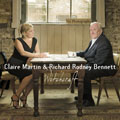 I
can’t pretend to be clued up about jazz, but I do know
what I like and I specially like to listen to it late at night.
I know only a small repertoire – my equivalent of the ‘little
bit of ivory’ to which Jane Austen limited the world of
her novels – with the likes of Dave Brubeck and Stéphane
Grappelli at its heart. It needs to be expanded – after
all, Jane Austen bores me to tears precisely because her world
is so limited – and this is just the sort of album to do
it.
I
can’t pretend to be clued up about jazz, but I do know
what I like and I specially like to listen to it late at night.
I know only a small repertoire – my equivalent of the ‘little
bit of ivory’ to which Jane Austen limited the world of
her novels – with the likes of Dave Brubeck and Stéphane
Grappelli at its heart. It needs to be expanded – after
all, Jane Austen bores me to tears precisely because her world
is so limited – and this is just the sort of album to do
it.
The collaboration between Claire Martin and Richard Rodney Bennett
works superbly; though there’s no question who provides
the greater vocals, Bennett’s accompaniment underpins the
whole project superbly. Very good recording and a decent booklet
of notes set the seal on a recording to which I shall be returning
regularly. The only reservation that I need express concerns
the short playing-time.












